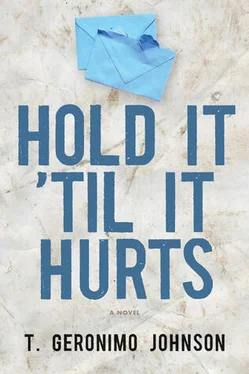“Are you going to quit?”
Wages lit a cigarette for emphasis, jabbing the evening air with the angry red eye. “I don’t quit shit. I’m just telling you what he said. It explains my dreams and shit.” As Wages explained it, the ritual involved a shaman helping warriors readjust to domestic life. “Even the Greeks had this problem. You have to get back into the community.”
“Like redemption?” asked Achilles.
“Impossible,” said Wages. “Redemption is out. Besides, it would mean we did something wrong.”
Chaplain Weidman was known for his practical penance. Merriweather had admitted to once helping some friends steal a truckload of computers destined for an elementary school. His penance: do something nice for some children. Ramirez had admitted to cheating on his girlfriend, just to stay “free.” His penance: If he loved her, tell her. If not, let her go. Jackson, a onetime cab driver, often claimed that his meter was broken on Friday nights. His penance: give the occasional free ride when he returned. “Is it like practical penance?”
“It’s not a religious thing. It’s more spiritual-like.”
“Like confession?” asked Achilles. “Or therapy?”
“No and no,” said Wages. “It’s none of that, nothing like that at all. It’s just a ritual, letting go.”
“Forgetting?” asked Achilles.
“No!”
“Being forgiven?” asked Achilles.
“We didn’t do anything to be forgiven for,” groaned Wages. “We were hired to do a job. If there’s a hell below, you know.”
You’re exasperated? Achilles wanted to grab Wages and shake him. “What the fuck is it then? Is it like Merriweather?”
“He just had bad luck.”
“The kid,” whispered Achilles. “The knife?”
“What are you talking about?” Wages stared at him. “You mean trying to dig that shrapnel out?”
Achilles listened quietly after that.
“Another person helps you let go of what you hold. Some tribes believe that the warrior is haunted by his knowledge. We call it memory, but really it’s knowledge. We know how motherfuckers really are. The things we know, the things we’ve seen, the things we carry are a burden but also a gift, our gift to everyone else. We carry the terror so they don’t have to. It’s about getting back on even footing.” Wages handed Achilles a sheet of paper. “It’s my combat exam. Everyone should get one.” He said this in an offhanded manner, as if he were referring to a platinum card with mileage rewards.
A single sheet of blue paper with two columns, it detailed his experiences on active duty. The left column listed questions: Number of times under fire? Number of times seen people hit? Number of times seen people killed? Number of times in direct danger of being killed? Number of times involved in ambushes or house-clearing missions? Number of times killed people? The right side held the answers. Under fire over 37 times. Seen people hit 40 times. Seen people killed at close range 76 times. In direct danger of being killed 32 times. Participated in 112 ambushes or house-clearing missions. Killed 12 people.
“I can’t believe you don’t dream about this shit.”
Achilles couldn’t believe it either, because he had been there for almost all of it.
BEING HOME AFTER ACTIVE DUTY HAD BEEN A SUDDEN AND VIOLENT deceleration, like hitting the ground without a chute. He felt that way again now. Achilles had extensively researched suicide, looking for the clues he must have missed. Talking about death, changes in sleep and behavior, heavy drinking, anxiety about losing control, and recent loss are all warning signs. But that was how everyone he knew had lived for the past two years. Loss of freedom, moving, death of a friend are all possible causes. But that described how he’d felt that night in the church tower when he didn’t shoot Pepper, and again in the morgue in the closet of ashes, and holding Jackson’s hand. And he wasn’t suicidal. The symptoms described everyone he knew, it seemed, so it was hard to guess what he should have noticed about Wages on the rare occasions when they had talked.
He wanted to believe there had to be an answer, be it prayer or the oneness of the universe, as the patchouli-scented museum lecturer said, but that worried him because if his soul was a universe, it was probably full of black holes. He even considered reenlisting, but had to admit he was no longer sure he was built for it. His body was slowing down. Mornings, he woke sore and stiff, like he had fought all night.
Some evenings he and Ines ate outside, talking constantly to beat back the silence. There were no birds, no cats, and little traffic, so every gap in conversation was deathly still. She told him about the people who came into the phone room to check the bulletin board for pictures of friends and family, the joys and disappointments, the near misses and the occasional happy connection. He nodded. Then he told her about his day. He hadn’t been with Charlie 1 for a few weeks but kept in touch with them, and so knew that they were on house-clearing duty, going from door to door to alert the coroners. It wasn’t hard to make up the details. He took a story from Goddamnistan, changed the complexions and the locations, and it sounded as if it happened blocks away, not in another country, in another time. The days and nights were long and restless, with Achilles facing the real fact that for the first time he had no purpose in his life and saw little to look forward to.
So he was especially heartened when about a week after Wages’s funeral, Ines requested that he accompany her to Uptown. She obviously needed him to run interference, the presence of a guest ensuring that Mrs. D would be on the best of her worst behavior. Or maybe she wanted company, knowing that it wasn’t safe to travel alone. Or, he thought, maybe Ines needed to show that she was maintaining this relationship, that she was stable.
Referring to her daughter as a “present-day Earl of Cardigan,” Mrs. Delesseppes had once admitted that her concern for Ines’s quixotic nature had abated only after meeting Achilles. “While a single enthusiast is a zealot, two, if loyal, committed, and pure of heart, could indeed a movement make.” He took that as a compliment, even if Mrs. D remained reserved in his presence.
Whatever the reason, it was reassuring to be needed. When they arrived, the house was quiet. The shutters hadn’t yet been replaced, but there had been a few feeble attempts to restore the property. Rocks lined the walkway to the house, potted plants either side of the porch. Though ruined by the rain and all the foot traffic to and from the phone bank, the yard was no longer a bog. It had dried out, and someone had raked it, combing the dirt in neat swirls. The sidewalk had been swept of the layer of silt that had coated it immediately after the storm, but it hadn’t yet been pressure-washed and so it still looked dingy, as did the foundation, the whole house skirted in a ring of gray mud that would probably have to be painted over. During his first visit he had been so awed, he’d expected to have to pay to enter the house, or use a separate entrance, or take off his shoes. Before it had felt more like a museum than a home. In the place of the majestic home now stood this relic of a bygone era, broken down, chimney crumbling, shades drawn, falling in on itself, the house appearing to wait for the last occupant to leave so it could collapse on itself or break in two.
Inside was another world, but a different world from what he remembered. Taking in refugees had given the house life and purpose. Gone were the aprons, housekeeping dresses, and smocks. Gone were the tuxedoes and propeller ties and chef toques. Gone was the livery dressed as if to grieve. The staff wore casual clothes, which ironically only heightened the sense that the house was in mourning.
Читать дальше












